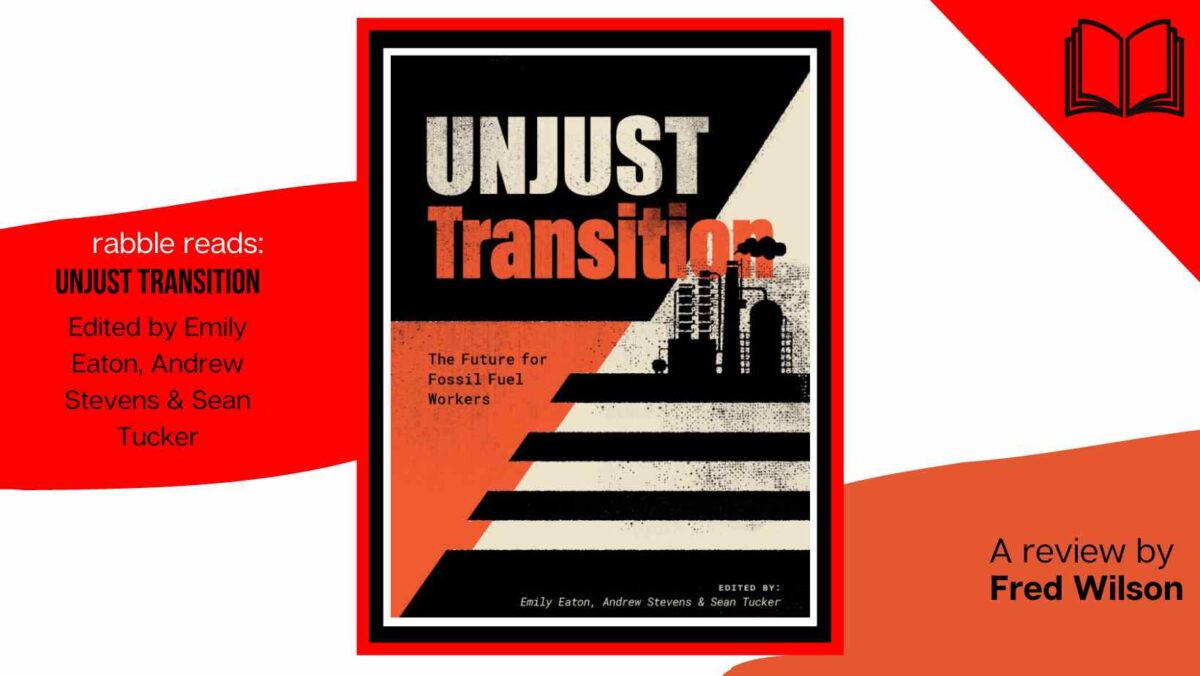Strikes and lockouts are everyday occurrences and vignettes of class struggles that are inherent to capitalism. Occasionally, a labour dispute will erupt into a heightened conflict of watershed proportions that stress test labour and capital and block or accelerate socio-economic trends. The 2019-2020 six month lockout of Unifor Local 594 at the CoOp Refinery Complex in Regina was one of those events.
However these kinds of extraordinary struggles are rarely studied and assessed in depth as the authors of Unjust Transition have done in their comprehensive history and analysis of the Regina refinery lockout. The editors and six other contributors had the luxuries of retrospection, detail and dispassion that union activists usually do not have. But those advantages make this unabashedly pro-worker book an essential read.
There are two concurrent themes running through Unjust Transition. The high level theme places the refinery struggle in the context of energy transition. It is an analysis that is comprehensively made in this book for the first time. And it will be read by some as a novel analysis because the lockout was widely seen as a contest between a brutal employer and a militant union, and not fought out on energy transition issues.
The ground level theme is the narrative story of the deliberate plan to lockout 700 refinery workers to extract concessions from them over pensions and workforce structure.
Historically, the Federated Cooperatives Limited (FCL), the parent company of the refinery, and the union generally had good working relationships. FCL with its roots in the prairie CoOp movement consistently followed the industry pattern and negotiated local agreements with Local 594. But over the previous decade refinery management had become increasingly hostile to the union, and in 2019 it was flush from two consecutive years of billion dollar profits and eager to go on the offensive against the union and long standing collective agreement provisions. Long before negotiations began in 2019 the company had made extensive plans to scab and break a strike that they predicted their demands would provoke, and the plan was ruthlessly executed.
Unifor responded to the company’s assault with mass picketing and defiance of injunctions with barricades and picket line confrontations that saw the arrests of Unifor leaders. The union organized a national boycott of FCL businesses and products and organized secondary picketing throughout Saskatchewan. But as the long winter of 2020 wore on, the Regina police and the courts provided the company with a decisive balance of forces. In the end the union saw no choice but to return to work largely on the company’s terms. But they did so with union solidarity intact; not a single union member had responded to the company’s appeal to cross their picket lines.
This classic class struggle story is elaborated in Unjust Transition through a series of essay chapters. The editors (Eaton, Stevens, Tucker) give a step by step account of the negotiations and lockout actions, and the principal issues surrounding pensions are explained in the context of the larger employer attack on defined benefit pension plans (Kevin Skerett).
A particularly interesting chapter is provided by Charles Smith and Lisa Wanlin on the role of Saskatchewan courts and their decidedly pro-employer decisions to undermine Unifor’s picket lines. Additional chapters give a history of the CoOp refinery and its economic and community presence in Regina (Patricia Elliott) and a deep dive into refinery worker and community safety issues and how safety issues became public issues during the lockout (Sean Tucker). All that detail is expanded further with an assessment of media coverage of the lockout by mainstream and alternative media. (Doug Nesbit and Emily Leedham). Not least there is a chapter of worker voices based on interviews with Local 594 rank and file members.
The high level theme of Unjust Transition bookends the lockout story and it poses a key question. Was the company’s assault on the union motivated by corporate greed and power that unions have always faced, or were the company’s actions in part a result of the climate crisis and its impact on the energy sector.
Certainly neither FCL or Unifor brought energy transition issues to the bargaining table or to their public campaigns during the lockout. However the authors cite employer communications that make a link:
“In the years leading up to and during the lockout the employer justified its demands in terms of cost savings that were necessary for investments to shift to a low carbon economy. Two weeks prior to the lockout in an open letter the company reasoned that pension concessions were needed ‘because we understand that a shift in our traditional fossil fuel market is already taking place, and we must be prepared to address the challenges with significant investment in our refinery.’ And yet local media and analysts who covered the historic dispute left the companies stated reason for locking out their workers largely unexamined.”
The link is made, but the authors also give more than enough evidence that FCL’s commitment to a low carbon economy was and is utter greenwashing and their pleadings for cost reductions to make investments are belied by their substantial and growing profits.
Unjust Transition ends with a thoughtful chapter on labour and environmental just transition and the need for an independent labour agenda to protect workers through a coming period of climate crisis, economic and social change. An agenda is presented with “characteristics of a just transition for oil and gas workers in Canada.”
Eaton, Stevens and Tucker assert that the next big struggle between capital and labour in the fossil fuel industries will be about energy transition, who benefits by it and pays for it. The suggestion is left that round one of that fight took place in Regina in 2020.




